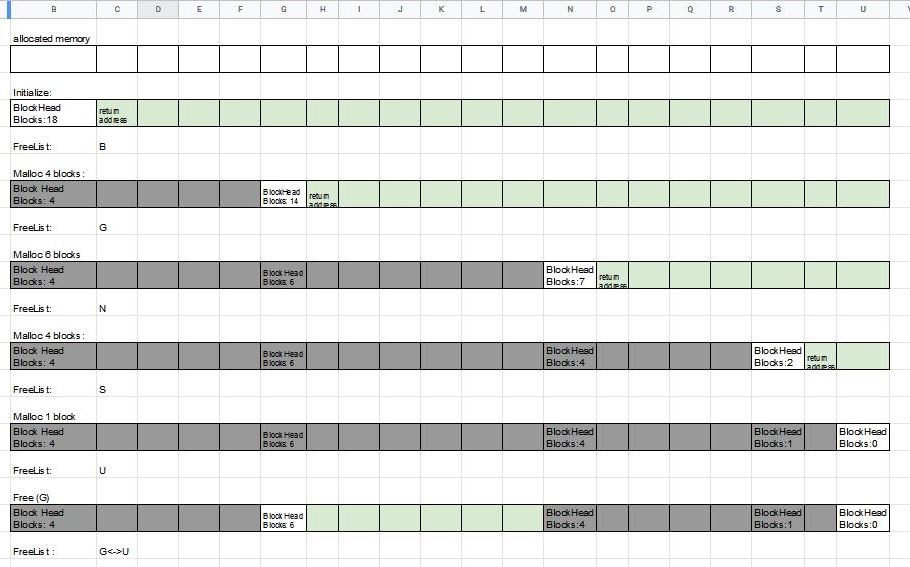I wrote a memory management class that is supposed to be used in a game.
I decided to use "Blocks" as an in-code representation.
It is written in MSVC++ and is currently not meant for portability. I am actually not really experienced in C++ - I just wanted to "try it out".
The pool is not meant to grow - it is initialized once and can be reset (for example on Level load).
The BlockHeader is both an explicit and implicit free list. It contains the next/previous free and the next/previous physical Block. Here is an outdated image of how the internal representation is :

#pragma once
#include <stdint.h>
#include <memory>
#include <iostream>
#include "Game/debug/assert.h"
#include "Game/debug/log.h"
#include <type_traits>
namespace T5M::Memory {
//Block Size suggestions
enum class BlockSize : size_t {
Minimal = 4,
Tiny = 8,
Small = 16,
Medium = 32,
Big = 64,
Huge = 128,
};
//A multi purpose Memory pool
template<unsigned BlkSz>
class Pool {
static_assert(BlkSz > 0 && (BlkSz & (BlkSz - 1)) == 0,"Block Size needs to be PoT!");
using Size = size_t;
using Byte = uint8_t;
using Magic = uint32_t;
//Returns the number of Blocks needed for the number of Bytes
static constexpr Size getBlockCount(Size bytes) {
return (bytes + (static_cast<Size>(BlkSz) - 1)) / static_cast<Size>(BlkSz);
}
//Block representation
struct Block {
Byte data[static_cast<Size>(BlkSz)];
};
// Block Header Data. Contains either Data about Free Blocks in the case of Free
// Or Number of Blocks that were allocated in the case of Used
union BlockHeader;
struct BlockHeaderData {
Magic magic;
//pointer to the next BlockHeader, nullptr if tail
BlockHeader* nextFreeBlock;
//pointer to the previous BlockHeader, nullptr if head
BlockHeader* previousFreeBlock;
//Number of Free Blocks / Used Blocks
Size managedBlocks;
//Whether this Header is Free or Used
bool isFree;
//pointer to the next physical block header
BlockHeader* nextPhysicalBlock;
//pointer to the previous physical block header
BlockHeader* previousPhysicalBlock;
//pointer to first physical block header
BlockHeaderData() : magic(MAGIC), nextFreeBlock(nullptr), previousFreeBlock(nullptr), managedBlocks(0), nextPhysicalBlock(nullptr), previousPhysicalBlock(nullptr), isFree(false) {}
};
union BlockHeader {
BlockHeaderData data;
//Padding to ensure BlockHeader is always the next multiple of BlkSz blocks large
Block padding[getBlockCount(sizeof(BlockHeaderData))];
BlockHeader() : data(BlockHeaderData()) {};
};
private:
static constexpr Magic MAGIC = 0xDEADBEEF;
Size allocatedBlockCount;
Size allocatedBytesCount;
const std::unique_ptr<Block> allocatedBlocks;
BlockHeader* head;
BlockHeader* firstPhysicalBlock;
void initialize() {
std::memset(allocatedBlocks.get(), 0, allocatedBytesCount);
// Place initial BlockHeader at the beginning of all blocks
head = new(allocatedBlocks.get())BlockHeader();
head->data.nextFreeBlock = nullptr;
head->data.managedBlocks = allocatedBlockCount - getHeaderBlockCount();
head->data.previousFreeBlock = nullptr;
head->data.nextPhysicalBlock = nullptr;
head->data.previousPhysicalBlock = nullptr;
this->firstPhysicalBlock = head;
}
public:
Pool(Size numBlocks) : allocatedBlockCount(numBlocks), allocatedBytesCount(sizeof(Block)* numBlocks) , allocatedBlocks(new Block[numBlocks]) {
initialize();
Log("Pool Init: Initialized Pool with " << numBlocks << " Blocks")
Log("Pool Init: Free Blocks :" << head->data.managedBlocks)
}
private:
constexpr Size getHeaderBlockCount() const {
return getBlockCount(sizeof(BlockHeader));
};
//try coalescing with the next block in the list
void tryCoalesce(BlockHeader* origin) {
BlockHeader* left = origin->data.previousPhysicalBlock;
BlockHeader* right = origin->data.nextPhysicalBlock;
if (right != nullptr && right->data.isFree)
coalesce(origin, right);
if (left != nullptr && left->data.isFree)
coalesce(left, origin);
}
void coalesce(BlockHeader* left, BlockHeader* right) {
Log("Coalescing BlockHeader at " << left << " & " << right )
//accumulate free blocks + now obsolete header data
left->data.managedBlocks += right->data.managedBlocks;
left->data.managedBlocks += getHeaderBlockCount();
//relink so left points to right->next
left->data.nextFreeBlock = right->data.nextFreeBlock;
left->data.nextPhysicalBlock = right->data.nextPhysicalBlock;
//relink so right->next->previous points to left
if (right->data.nextFreeBlock != nullptr) {
right->data.nextFreeBlock->data.previousFreeBlock = left;
}
}
public:
template <typename T,typename ... Args>
[[nodiscard]]T* malloc(Size count = 1,Args&&...args) noexcept {
//Forbid allocation of size 0
if (count < 1) return nullptr;
//assertm(count >= 1,"Allocation Size must be greater than 0!");
// calculate the amount of blocks we want
Size requestedBlocks = getBlockCount(sizeof(T) * count);
Log("Malloc: Requested Blocks for " << typeid(T).name() << " x " << count << ": " << requestedBlocks)
BlockHeader* currentNode = head;
//Make sure we have enough space for one Block Header and one free Block!
while (currentNode != nullptr && currentNode->data.managedBlocks < requestedBlocks+getHeaderBlockCount()) {
assertm(currentNode->data.magic == MAGIC, "Pool is corrupt");
currentNode = currentNode->data.nextFreeBlock;
}
//We could not find a block of suitable size
assertm(currentNode != nullptr, "Pool is full");
//Free Blocks are directly behind BlockHeader
Block* blockToReturn = reinterpret_cast<Block*>(currentNode + 1);
Log("Malloc: Return block at " << blockToReturn)
//The current node will be removed from Free List, so keep the number of Blocks that will be deallocated for later!
Size numFreeBlocksAfterSplit = currentNode->data.managedBlocks - ((getHeaderBlockCount()));
currentNode->data.managedBlocks = requestedBlocks;
currentNode->data.isFree = false;
Block* splitBlock = blockToReturn + requestedBlocks + 1;
//Place a new BlockHeader right after the Requested Block
BlockHeader* newHead = new(splitBlock)BlockHeader();
Log("Malloc: New Head at " << newHead)
newHead->data.previousPhysicalBlock = currentNode;
newHead->data.nextPhysicalBlock = currentNode->data.nextPhysicalBlock;
currentNode->data.nextPhysicalBlock = newHead;
newHead->data.isFree = true;
head = newHead;
head->data.nextFreeBlock = currentNode->data.nextFreeBlock;
head->data.managedBlocks = numFreeBlocksAfterSplit;
Log("Malloc: New Free Blocks : " << numFreeBlocksAfterSplit)
return new(blockToReturn)T(std::forward<Args>(args)...);
}
void free(void* ptr) {
assertm((ptr >= allocatedBlocks.get() && ptr < (allocatedBlocks.get() + allocatedBlockCount)), "memory must be in Pool range!");
//Go to the point infront of the pointer to free, where an old header was before
BlockHeader* blockHead = (reinterpret_cast<BlockHeader*>(ptr)) - 1;
if (blockHead->data.magic == MAGIC) {
Log("Free: BlockHeader at " << blockHead )
BlockHeader* oldHead = head;
BlockHeader* newHead = blockHead;
head = newHead;
head->data.isFree = true;
head->data.nextFreeBlock = oldHead;
oldHead->data.previousFreeBlock = head;
//Now try to coalesce with the next and previous physical block
tryCoalesce(blockHead);
tryCoalesce(oldHead);
}
}
void reset() {
initialize();
}
};
}
content of assert.h:
#pragma once
#include <cassert>
#ifndef assertm
#define assertm(exp, msg) assert(((void)msg, exp))
#endif
content of log.h:
#pragma once
#if _DEBUG
#include <iostream>
#include <ostream>
#ifndef Log
#define Log(x) std::cout << x << std::endl;
#endif
#else
#define Log(x)
#endif

0xDEADBEEFis used in lots of situations. Especially common for debuggers. en.wikipedia.org/wiki/Hexspeak See the notable magic numbers and pick one NOT in the list. \$\endgroup\$mallocconstructs an instance of T. But yourfreeaccepts avoid*. Who is responsible for calling the destructor of the object? The user or the library? Either accept aT*and call the destructor, or only return avoid*frommallocand leave object construction to the caller. \$\endgroup\$